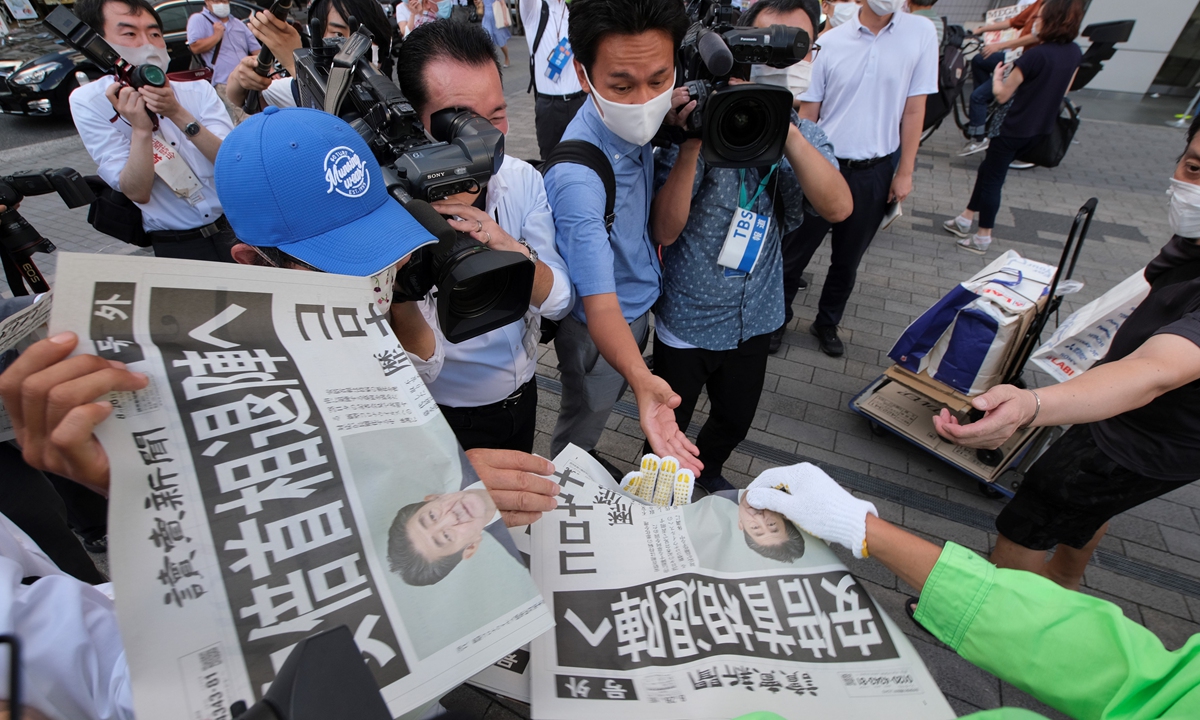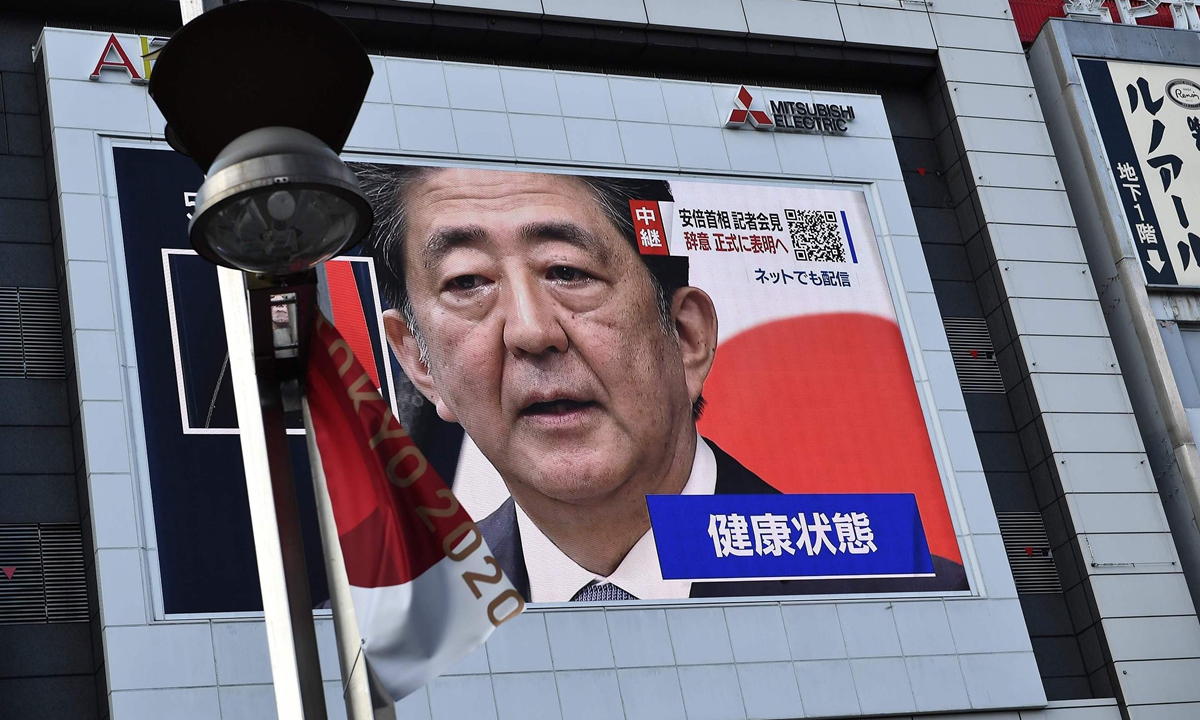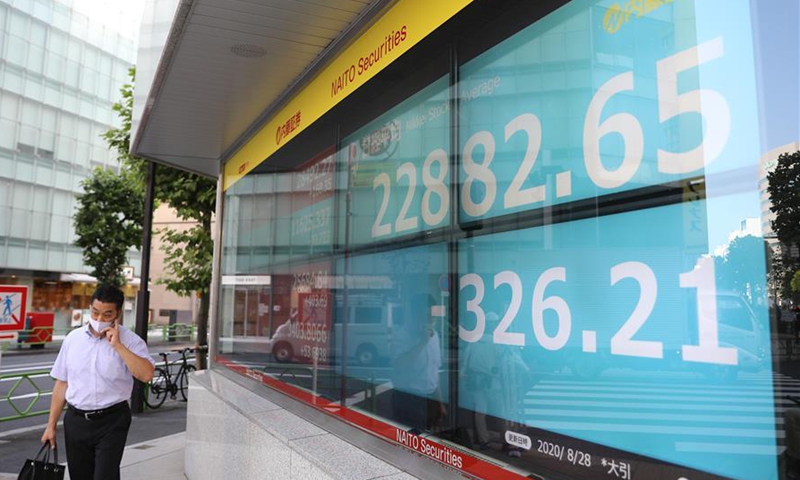Possible fluctuations in post-Abe policies a test for China-Japan ties
By GT staff reporters Source: Global Times Published: 2020/8/28 23:33:40
Japan likely to choose new prime minister in 20 days in emergency election: expert

Pedestrians get extra copies of newspapers following Prime Minister Shinzo Abe's resignation in Tokyo on Friday. Abe cited health problems. Photo: AFP
Japan's longest-serving prime minister Shinzo Abe announced on Friday he would step down due to health issues, four days after achieving the record-breaking tenure in office. Analysts said Japan will very likely return to its old state of having a constant turnover of top leaders, which may make China-Japan relations uncertain.
Abe, 65, has been prime minister for nearly eight consecutive years, considered unusual in a country which had six prime ministers in six years before Abe took office in 2012. At Friday's media conference, Abe said his bowel disease had worsened.
Wang Guangtao, an associate research fellow at the Center for Japanese Studies of Fudan University, told the Global Times on Friday that judging from the system of electing the president of the Liberal Democratic Party (LDP), Japan may not have a long-serving prime minister like Abe. Faction politics is an important feature of Japanese politics.
"In terms of China-Japan relations, the constant change in leadership within the LDP will cast doubts on the continuity of policies. If policies keep changing, it will do no good to either China or Japan," he said.
At Friday's regular media briefing, Chinese Foreign Ministry spokesman Zhao Lijian said China is willing to continue to push forward bilateral relations with Japan.
"This is an implicit approval of Abe's China policy, especially during the latter half of his tenure. China does not want to see instability in Japanese politics. No matter the change of government or the change of LDP president, the willingness of Abe's successor to promote ties with China is crucial," Wang said.
Analysts said no matter who would be the successor, he should learn to get on well with China for the benefit of Japan. Japan's economic future cannot be guaranteed without cooperation with China.
Before he assumed office, China-Japan relations were at one of their lowest points, as the Japanese administration announced the "nationalization" of the Diaoyu Islands, and ties were strained when Abe visited the Yasukuni Shrine in 2013. Relations gradually improved in recent years, despite some friction.

Photo:VCG
Potential successors
Da Zhigang, director and research fellow of the Institute of Northeast Asian Studies at Heilongjiang Provincial Academy of Social Sciences, told the Global Times on Friday that the LDPis likely to push for an emergency election rather than a normal election due to the COVID-19 pandemic, which may elect the new prime minister within 20 days.
The LDP is considering holding a leadership election on September 15 or around that day, Kyodo News reported.
On potential successors, if it's an emergency election, Da predicts that former foreign minister Fumio Kishida and current Chief Cabinet Secretary Suga Yoshihide would be two powerful candidates.
"China-Japan relations and Japan-US relations will not significantly change no matter who becomes the next prime minister," Da said.
Li Shuo, a doctoral candidate at the Japan Institute of Nankai University, told the Global Times on Friday that Fumio Kishida is more likely to be Abe's successor, as he holds advantages in the LDP, and was relatively popular. He is also a mature and rational politician with rich diplomatic experiences.
"Japan's US policy will not change much, and will continue to emphasize the importance of the Japan-US alliance. China-Japan relations will also remain stable," he said.
However, Li pointed out that the new prime minister will still be bound to push forward a constitution amendment, as provided in the guidelines of the LDP.
Wang told the Global Times that it remains to be seen how the new government's policies will be affected by the international situation.
"If it cannot continue the previous policies, especially if the prime minister keeps changing like what we saw in the past, Japan's domestic politics and economy may enter a situation similar to the time of Junichiro Koizumi. Under such circumstances, it would inevitably affect China ties," he said.

A pedestrian wearing a face mask walks past an electronic board showing the stock index in Tokyo, Japan, on Aug. 28, 2020. Tokyo stocks closed lower Friday as investor sentiment was dented by reports saying that Japanese Prime Minister Shinzo Abe will step down as the nation's leader due to health issues.Photo:Xinhua
Learning curve
Da said it takes time for the new prime minister to engage with leaders of other countries, as Abe had established perfect personal relations with some world leaders while remaining relatively independent in foreign policy.
It's possible that the next prime minister will resume talks with China on the Chinese leaders' Japan visit, Da said.
Chinese President Xi Jinping had planned to pay a state visit to Japan this April, but the visit was postponed due to the coronavirus. It's still unknown whether the scheduled visit will push through, as Japan behaved badly recently on issues affecting China's core interests.
Xu Jingbo, head of the Asian News Agency in Japan, told the Global Times that during Abe's more than seven years in office, he grasped the techniques of dealing with China and the US, and did not take a hard line on China even after being pressured by the US.
Abe had shown maturity and rationality in handling China-Japan relations. Although the disputes over the Diaoyu Islands have been ongoing, it did not worsen relations to the extent that we saw during the rule of the Democratic Party of Japan. Also, despite Abe following the US in military and security matters to suppress China, this did not jeopardize the overall trajectory of China-Japan relations. Social, cultural and economic cooperation have been carried out,
Analysts said Japanese companies rely heavily on China. While it was reported that the Japanese government provided subsidies to companies moving their production lines out of China amid the pandemic, many Japanese companies said they won't move out of China, and instead would increase investments, given China's large market, media reported.
More than 32,000 Japanese companies operate in China, with manufacturing firms accounting for 42 percent, retail and wholesale companies 33.2 percent, and service industry firms accounting for 12.2 percent, news portal yicai.com reported.
Xu said the Japanese government knew that Japan's economy has benefited a lot from economic exchanges with China, and Japanese companies have voiced their support for stronger China-Japan relations, which also influenced the Japanese government.
Newspaper headline: Abe resignation complicates ties
Posted in: DIPLOMACY